Category — Klezmer
WHAT’S YOUR TIME WORTH?
My time is worth $107.98 an hour.
I lost two harmonicas at a gig yesterday. I never lose anything. And I had bragged about finding my wife’s Visa card, which had been missing for a day. Alice considered calling the 800-number and canceling. No, Alice, that’s nightmare city. Alice walked in the snow for four miles looking for the Visa card, which she thought might have fallen out of her pocket while biking.
She didn’t find the card. I found it in the bedroom under a bed. I don’t know how the card got there. I always use a flashlight to search for missing stuff. That’s my trick; the flashlight helps me focus.
My harmonicas were in a gig bag, which I hadn’t fully zipped. I think the harps wound up in the snow in the parking lot at a nursing home, where I had a gig last night. I didn’t “hear” the harps fall in the snow. The last time I lost something was a ski cap — also in the snow.
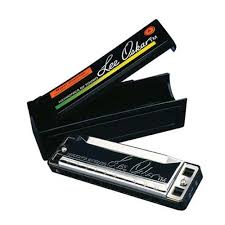
I think I’ll order two harps on Amazon, $107.98 total. The harmonicas will arrive tomorrow. I don’t feel like driving 16 minutes each way to the nursing home to look for the harps. That’s 12 miles round-trip — a significant haul by Cleveland standards. And then another half hour looking for the harps.
I’ve called the nursing home. So far, nothing.
My two choices: 1) pay $108 for two harps, or 2) drive 32 minutes, plus spend time looking for the harps in the snow. And don’t forget the depreciation on my car.
(“Yesterday” was actually Jan. 16, 2025. I bought the harps.)
February 12, 2025 1 Comment
MILLIONS OF CATHOLICS
AND SOME JEWS
When my kids were young, every Chanukah I would take them to the various Jewish bookstores around town to buy decorations and Chanukah books and toys, just so they would get used to these places. At Frank’s Hebrew Bookstore, I thought I was in Poland: tallisim (prayer shawls), spice boxes, yarmulkes. A photo of Koufax on the wall — that would have helped.
Also, I drove my kids to the Christmas lights at General Electric’s Nela Park. That was a family tradition, started by my parents in the 1950s. Why not? Lights is lights.
Yiddishe Cup used to play holiday parties at the Cleveland Plain Dealer. We would stroll table to table. Just about everybody asked for Christmas carols.
Hey, I didn’t start Yiddishe Cup to play “Silent Night.” I said no to all Christmas requests. We would play “Hava Nagila” or tunes from Fiddler on the Roof, if asked. Dick Feagler, a renowned Plain Dealer columnist, gave us the thumbs-up for staying Jewish. Dick apparently liked our Full Cleveland approach. (Full Cleveland meant polka, klez, bandura, tamburitza, salsa. All good.) No rock for Dick.
After strolling to about 10 tables, I cracked; I couldn’t take any more “What? You don’t do Christmas songs?” We played Jose Feliciano’s “Feliz Navidad.” Christmas in Spanish was OK.
—
My family went to KlezKamp in the Catskills during Christmas week for more than a decade. At first I couldn’t get my wife, Alice, to go. We had young kids and she didn’t want to schlep them. One year I took the two oldest kids and went without her. I spent a lot of time in the hotel game room and swimming pool that year. That chemical vat, a k a pool, was only slightly larger than a half dollar, and you had to coat yourself with 100-proof skin cream or get a rash.
The kids and I went to New York City afterward. My daughter, Lucy, then 5, made me carry her everywhere. We didn’t get too far. We went to Popeye’s on Times Square for dinner.
When we got back to Cleveland, Alice said at the doorway, “The kids look anemic!”
Alice, we had beans and rice and lemonade at Popeye’s! (The kids hadn’t been too crazy about the borscht and herring at KlezKamp.)
Alice has never trusted me with food, or childrearing for that matter.
The following year Alice came with us to Klezkamp. All five of us. Alice was a folk dancer and exercise nut; however, Jews at klezmer conventions are not typically exercise freaks. Alice found a nearby indoor tennis court which was so dusty the balls turned black after one set. It was like playing in a parking garage. We went skiing on Christmas. I thought the slopes would be empty, but no, a lot of Asians and Jews from New York City were there.
We snuck over to The Pines resort for ice skating. That place looked like a staging area for a Borscht Belt revival movie. We had a good time checking out trivia contests in the lobby. I’ve got nothing against middle-class Jews. I am one.
My family kept going back to KlezKamp every Christmas. Ikh khulem fun a vaysn nitl. (I’m dreaming of a white Christmas.) And every year Alice would complain: “I can’t believe we’re going to KlezKamp again!”

Jack Stratton, Merlin Shepherd (kneeling) and Lucy Stratton. KlezKamp 1993.
Finally, after 12 years, the brainwashing was complete; the kids knew more Yiddish than oy vey and farklempt, and they knew a lot about klezmer music, and Alice could have, by then, taught the dance classes. And I had met all the old klez guys: Max Epstein, Felix Fibich, Danny Rubenstein, Velvel Pasternak. Paul Pincus, Leon Schwartz, Ray Musiker, Ben Bazyler, Sid Beckerman, German Goldenshteyn, Howie Leess, Elaine Hoffman Watts.
They’re probably all dead now.
I paid my dues.
—
“Merry Christmas” is OK with me. Beats “Happy Holidays.” I once went to a West Side house for Christmas and about 12 Ukrainian girls walked in and caroled us. And they were in full regalia. That was my most Christmas-y experience – until this year.
I went to Mass yesterday. Midnight Mass (which was actually at 4 pm for AKs like me and families with young kids). Joint was jumping. St. Ann Church, Cleveland Heights. A field trip. Park Synagogue’s senior rabbi, Joshua Skoff, led the outing.
The priest prayed for the well-being of the pope, Cleveland’s bishop, etcetera, on down to the “millions of Catholics” throughout the world. Millions — that word hit me. We Jews don’t bandy millions around lightly. That’s some big tent those Catholics have.
I miss KlezKamp. I like the small-ball game of Judaism. Only 15.8 million of us, and we all know each other!
December 25, 2024 3 Comments
THANKSGIVING GIG
The mother of the bride thought Thanksgiving Day would be a great time for a wedding because nobody would come. The groom’s side was from New York. Flights to Cleveland would be expensive. And many Cleveland guests would skip the wedding to eat Thanksgiving dinner at home with their kids. The cost-conscious mom was cutting serious corners.
 Yiddishe Cup musicians rescheduled their personal Thanksgiving dinners to play the gig. Not an easy task, but doable. Then the mom called me again and said the bride wanted a different band. What? Who? I usually ask who the other band is, but I was so mad — mostly at myself because I had forgotten rule #1 in the wedding-band biz: it’s all about the bride. The bride, not the mom, picks the band.
Yiddishe Cup musicians rescheduled their personal Thanksgiving dinners to play the gig. Not an easy task, but doable. Then the mom called me again and said the bride wanted a different band. What? Who? I usually ask who the other band is, but I was so mad — mostly at myself because I had forgotten rule #1 in the wedding-band biz: it’s all about the bride. The bride, not the mom, picks the band.
I got a call from a bat mitzvah mom. She was a talker, just like the very frugal wedding mom. The bat mitzvah gig was going to be for TG weekend but not on TG itself. I didn’t pitch the mom too hard. I wasn’t crazy about playing on TG weekend. I said, “Yiddishe Cup has been around for decades. You’ve seen us. Everybody has seen us.”
She hired us. Then she canned us. She said her husband was sick. So what? Yiddishe Cup has played for sick people — even dead people; we once played a luncheon where the mom of the bat mitzvah had died the day before. We played in the family room instead of at the party center.
The bat mitzvah mom — the one who wanted us for TG weekend — said her husband had become depressed. The husband, a doctor, had lost a patient that week. Doctors lose patients all the time, right? The mom wanted to change the bat mitzvah date and the number of musicians.
Forget it.
What else can I say?
Happy Thanksgiving.
November 26, 2024 2 Comments
GOING SOLO
“Side Project”: A musician breaks away from his band and does his own thing. Almost all musicians do it, at least on occasion. But because my axe is clarinet, I can’t break away easily. Nobody wants to hear solo clarinet. I’m chained to my farkakte bandmates!
Not true. Last month I was hired at the last minute — a day prior to the gig — for a Holocaust survivors’ luncheon. My accompanist, pianist Alan Douglass, couldn’t make it. But Alan had fortuitously produced some backing tracks for me a while back, just in case.
And this was the case: Alberto Solo. I played “Besame Mucho,” “Di Grine Kusine” and “Moscow Nights.” I even blew shofar, clarinet-style. This was during the High Holidays.
Nineteen people, total. I reached all 19, I think. I sat with them; I ate with them; and played clarinet while seated at various tables. There was some sort of chicken roll, courtesy of the kosher caterer. “You Are My Sunshine,” “Misty,” klezmer instrumentals, and “Tumbalalaika,” of course.
I talked to a Romanian woman about her granddaughter, who plays drums in Broadway shows. A Polish woman jokingly said she has a German brother and an Italian brother. Her brothers were born in DP camps.

Former bandmate Irwin Weinberger, and his father, Herman, 1966. Herman was a Holocaust survivor from Poland.
I got paid by the Jewish Family Service Association and Germany, via an understanding called the Conference on Jewish Material Claims Against Germany — a worldwide Holocaust-reparations cultural-enrichment program.
I’ve previously played this gig with Alan. Two years ago I wrote about it: “Holocaust Remembrance at Cafe Europa. Everybody in the audience had an astonishing story.” (link, no paywall: Wall Street Journal.)
I needed Alan two years ago. Who needs him now?

Alan Douglass, 2011. He’s one of the best musicians in Cleveland. Ask anyone.
November 13, 2024 No Comments
PRECIOUS
You are precious. You suck.
You are overrefined and inauthentic.
A cappella music is precious. All of it. A friend once told me that. Harvey Pekar called Willio & Phillio precious. (Willio & Phillio were a talented 1980s-era Cleveland comedy/music group.) Maybe Harvey called Willio & Phillio precious because they were not anti-social like he was.
Willio & Phillio — the name — was certainly precious, and they should have changed it. Eventually Will Ryan (Willio) went out to Los Angeles to work for Disney, and Phil Barren (Phillio) became a cantor in Los Angeles.

2004
Yiddishe Cup — hate to say it — is precious. But only occasionally, like when we say “oy vey” followed by “olé.” Maybe we should disband.
Peter Laughner, the Cleveland guitarist, died from drug and alcohol abuse at 24. He was not precious. (He was part of the Pere Ubu underground scene.)
One last thing: You’re precious!
November 6, 2024 2 Comments
EGO
A musician told me he did 200 gigs a year. Impressive. He mentioned they were all nursing-home gigs. Not impressive. (I brag about my nursing home gigs but he can’t.)
The writer Donald Hall told me how much money he made for articles in the The New Yorker and Playboy. He had an audience.
Yiddishe Cup has an audience sometimes, sometimes not. Yiddishe Cup played for 30 people in Grand Rapids, Michigan. That was a long drive. (We’re playing tonight. Details below. A short drive — Pepper Pipes, Ohio.)
A neighbor recently asked my wife and me if we were available for dinner. No, Yiddishe Cup was going on a road trip; the band was flying to Lake Geneva, Wisconsin, for a wedding, then flying to Columbus the next day for a party, and driving home to Cleveland for something — probably a nursing home gig. The neighbor texted Alice and me: “Ahh, the Yiddishe Cup World Tour 2024! How could I forget? Keep on rocking!”
Musicians whine about “World Tour” road-trip trials and tribulations. And you think, “I’d like to do that — go on a tour. Shut up.”
Our recent Yiddishe Cup road-trip weekend was intense — and rare.
A woman asked me, “Does Yiddish Cup still exist?” She had been checking out our Yiddishe Cup website, which hasn’t been updated in years. Maybe I should update it.
—
. . . My cousin Howard Golden just updated the site. Here’s the new home page:
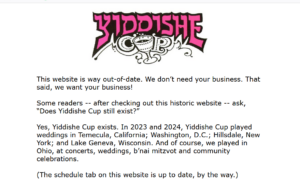
Is that legible? Probably not. Here’s what it says:
“This website is way out-of-date. We don’t need your business. That said, we want your business!
“Some readers — after checking out this historic website — ask, ‘Does Yiddishe Cup still exist?’
“Yes, Yiddishe Cup exists. In 2023 and 2024, Yiddishe Cup played weddings in Temecula, California; Washington, D.C.; Hillsdale, New York; and Lake Geneva, Wisconsin. And of course, we played in Ohio, at concerts, weddings, b’nai mitzvot and community celebrations.”
—
Yiddishe Cup plays tonight (Wed. Aug 28) at 7 p.m. at the outdoor, covered Wain Pavilion on the grounds of Park Synagogue, 27500 Shaker Blvd., Pepper Pipes, Ohio. There are chairs. The concert is free. And if you want, you can donate to Magen David Adom (the Israel Red Cross) at the show.
August 28, 2024 2 Comments
THE ONE AND ONLY
ROLAND HANNA
I talk a lot at nursing-home gigs. I like to get the audience talking, too. I ask the audience about their favorite delis and where they went to high school. One guy always heckles me – “Again with the high schools?” Yes, again with the high schools. And this guy is not even a resident; he visits a friend who lives in the nursing home.
I often ask listeners their names. At my last gig, there was a woman, Ona, who said she was named for the actress Ona Munson. Never heard of Ona Munson. I didn’t ask Ona where she went to high school because she’s from New Jersey and nobody in Cleveland knows about New Jersey high schools.
An elderly husky black man had some musical requests. He was a visitor. He wanted “One O’Clock Jump.” I didn’t know it. Then he said, “Anything by Glenn Miller?” I played “I Got Rhythm.” Close enough. He rocked-and-rolled to every song – clapping and singing along. Alan Douglass (my piano accompanist) and I played all kinds of music: klezmer, American pop, Israeli. The man grooved to everything. He said his name was Roland Hanna.
“Roland Hanna! I guess Alan and I better go home now,” I said. Alan and I would leave and let Roland take over. Roland smiled. Roland Hanna, the renowned pianist. Roland told us to continue.

Roland Hanna
Alan asked Roland if he liked “sweet soul,” a favorite genre of Alan’s. Roland was cool with that. Alan did “Stone in Love With You” by the Stylistics. Roland knew every word. Then Roland requested Billy Joel. It’s affecting when black musicians request songs by white artists. Roland said, “You can do Billy Joel! You’ve got a harmonica player.” I did have a harp. We played “Piano Man,” featuring harp.
Alan did a country tune, “Behind Closed Doors” by Charlie Rich, and we did the soul tune “My Girl,” and Alan did a funk tune, “Will It Go Round in Circles.” All for Roland Hanna.
Before the final tune of the set, I asked Roland if he wanted to play something with us. He passed. After the gig, we schmoozed. I asked if he still played. He said he had never played. He said he was Rollin Hannah, Cleveland Heights High class of ’69. He said, “It’s Rollin like in Sonny Rollins, and Hannah, spelled the same backwards and forward.”
—
Pianist Roland Hanna was a Detroit musician who played in the Thad Jones –Mel Lewis Big Band in New York in the 1970s. “Roland Hanna” — the name — stuck with me all these years. Stuck a bit too hard.
June 19, 2024 1 Comment
I GOT A GIG . . .
I landed a gig. Other musicians wanted in on it. We played for a Russian immigrants’ club at the Mayfield Road JCC, in 1988. The Russians liked the waltzes. Screw klezmer. I had hired two musicians who played with the Kleveland Klezmorim, Alan Douglass and Joel O’Sickey; and a Swiss jazz bass player, Francois Roland.
For the next gig, I hired a black jazz guitarist. All his Dm chords came out like Dm7’s (jazz chords). His name was Jewish though: Larry Ross.
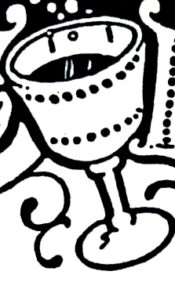 Those were the first two paying Yiddishe Cup gigs. The very first Yiddishe Cup gig was non-paying. We played on John Carroll University’s Jewish hour. The radio show host — a cantor, my cantor — couldn’t turn down a fellow congregant. Also, he often requested Jewish musicians stop by John Carroll to play on his show, and few did. John Carroll is a Jesuit school. Does Yeshiva University have a Catholic hour? The line-up for the John Carroll radio gig was Sandy Starr, fiddler from Indiana U.; Francois the Swiss; and me.
Those were the first two paying Yiddishe Cup gigs. The very first Yiddishe Cup gig was non-paying. We played on John Carroll University’s Jewish hour. The radio show host — a cantor, my cantor — couldn’t turn down a fellow congregant. Also, he often requested Jewish musicians stop by John Carroll to play on his show, and few did. John Carroll is a Jesuit school. Does Yeshiva University have a Catholic hour? The line-up for the John Carroll radio gig was Sandy Starr, fiddler from Indiana U.; Francois the Swiss; and me.
The rest is . . . whatever.
—
Here’s my essay that was in the Cleveland Plain Dealer on Friday:
Keeping Faith with Israel
CLEVELAND HEIGHTS, Ohio — I’ve been hearing bad things about Zionism since at least 1975. That was the year I wore a sticker which read “I Am a Zionist.” I got the sticker at the El Al ticket counter at Ben Gurion Airport. The United Nations had just passed the Soviet-sponsored “Zionism is racism” resolution. (The U.N. revoked that conclusion in 1991.) I wore the sticker in Greece — my next stop after Israel. I was 25. In Greece, a slightly drunk Greek man kissed the sticker, mistaking it for the blue-and-white Greek flag.
Back home, several of my friends were into edgier causes than Zionism. One friend said he was going to Cuba to harvest sugar cane. He didn’t go to Cuba, but he talked about it. I took a Hebrew class at Hillel at Case Western Reserve University to pick up basic Hebrew expressions, which I then used in Israel. I had grown up attending The Temple (also known as The Temple-Tifereth Israel and Silver’s Temple) in University Circle, and hadn’t learned much conversational Hebrew. (The Temple in University Circle is now the Maltz Performing Arts Center.)
”The Temple” — the name — sounded snobby, and it was. One Shaker Heights boy got a ride to temple in a limo. The driver wore a chauffeur’s cap. The limo wasn’t a Rolls; it was a Buick station wagon. The Temple was founded in 1850 by German Jews. The Temple moved to Beachwood 25 years ago. The Temple is not snobby these days.
Last century, The Temple wore its Zionism elegantly, in a Theodor Herzl, well-bred, top-hat way. Abba Hillel Silver was the senior rabbi. He was God-like –or at least Moses-esque –with a mane of silver hair and a booming voice. Rabbi Silver — along with Rabbi Stephen Wise of New York — were the two most prominent rabbis in post-war America. In 1947, Silver addressed the U.N. General Assembly. Silver said, “We are an ancient people and though we have often on the long, hard road which we have traveled been disillusioned, we have never been disheartened. We have never lost faith in the sovereignty and the ultimate triumph of great moral principles.”
The Temple, in the 1950s, sometimes held Sabbath services on Sundays instead of Saturdays, in a nod to their congregants’ acculturation into mainstream Christian-dominated America. My family put out Easter eggs, and I got Christmas presents. (No Christmas tree, though.) On the Jewish High Holidays, my mother wrote to my teachers: “Please excuse Bert’s absence from school due to religious observances.”
In the run-up to the 1967 Six-Day War, my parents attended an Israel Bond rally for the first time. They, and a lot of other Jews, thought there might be a second Holocaust. But after the quick Israeli victory, my parents began to utter “Jew” — the word — in public places in, for instance, restaurants, not caring whether other diners overheard them. In 1967, several of my high school friends wore “Jewish Power” buttons, purchased via mail order from a hippie button shop in Greenwich Village. I didn’t wear the button. The button-wearing kids had grown up in the Jewish section of South Euclid, near Cedar Center, not with the Italians like I had, closer to Mayfield Road. That Italian bread at Alesci’s, on Mayfield Road, was my go-to purchase on my walks home from elementary school.
My “I Am a Zionist” sticker is long gone, but I recently picked up a Jewish-star pin at a benefit for the American Friends of Magen David Adom (Israel Red Cross). I have played klezmer music at many community events and dozens of Israeli Independence Day celebrations. This year’s Israeli Independence Day celebration is Tuesday, and my band will be there.
Non-Jews, intrigued by the music, sometimes come up to me after performances and ask me some tough questions: “Do Jews believe in Jesus?” “How do you say c-h-a-l-l-a-h?” “Is Israel going to make it?”
My answers are: a) Jesus was a great man, but Jews don’t consider him the son of God; b) “Challah” is pronounced with a guttural “ch,” like you’re clearing your throat; c) It’s always a bad bet to count the Jews out. We’ve been around a long time.
The Jewish community in Cleveland numbers about 80,600. A Cleveland State University professor, Samantha Baskind, recently wrote an essay about Cleveland’s Jewish community for Tablet, an online magazine. She mentioned how Cleveland sent 1,700 Jews to Washington on buses for a pro-Israel rally in Washington last year. The headline of the article was “Cleveland’s Jewish Community Punches Above Its Weight Class.”
Here in Cleveland, we hope and pray that Israel punches above its weight, too. On Tuesday, my band will play the tune “Am Yisrael Chai” for Israeli Independence Day. “Am” means “people” in Hebrew. “Yisrael” means “Israel,” but in a biblical sense, as in “children of Israel,” meaning the Jews of Israel, Cleveland, and everywhere else. “Chai” means “lives.” Put it all together and you get: The Jewish People Lives.
Bert Stratton, a frequent contributor, lives in Cleveland Heights and has also written for The Wall Street Journal and New York Times. He writes the blog “Klezmer Guy: Real Music & Real Estate.”
May 15, 2024 2 Comments
MEMORY LOSS FLOOR
Alan Douglass and I played for six people in the memory loss unit. I asked for names and nobody gave one, except Bobbie. And nobody clapped.
“God Bless America.” Alan knocked that one out of the park. And maybe we did “Take Me Out to the Ballgame.” Can’t remember.
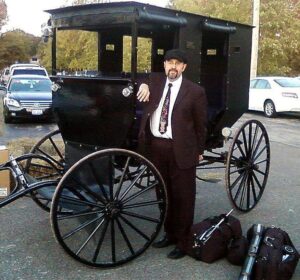
Alan Douglass. Yiddishe Cup gig, 2011.
Something funky? Alan did “Will It Go Round in Circles.” He told me to add a C harp, crossed position.
I didn’t know it was a memory loss unit. It only dawned on me a couple tunes in; there was absolutely no applause, except one aide clapped for “My Girl.” Usually people will clap for everything even if it’s bad.
A couple people sang along to “Tumbalalaika.” Bobbie was the most enthusiastic. She got up frequently, but the aide told her to sit. Bobbie was shaky. So were Alan and I. We did shaky tunes. It’s enervating playing for people who don’t respond much. But who knows, maybe they did respond deep-down. And don’t forget, “Tumbalalaika” kind of hit.
(Bobbie a pseudonym.)
—
Here’s an essay I had in the Cleveland Plain Dealer last Wednesday:
I Like Refrigerators
CLEVELAND HEIGHTS, Ohio — The plumbing-supply rep tried to sell me water-savings toilets. And another guy tried to sell me small refrigerators (less than 12 cubic feet) to fit in tiny apartment kitchens. There was a door-buzzer salesperson, too. This was downtown at a trade show for landlords. My wife had encouraged me to go. She had said, “You’ll have fun.”
I didn’t have fun, but it wasn’t painful. I ran into some fellow landlords I hadn’t seen much of. Landlords don’t meet up at the office; we’re out looking for late rent payers and plumbers who will actually show up. There were a lot of middle-class guys in sweaters and slacks. Some had on work boots. They probably owned duplex houses. Many of the landlords were mom-and-pop, owning a few buildings, like me. Some landlords wore bomber jackets and T-shirts. They were the big-time operators.
One landlord said he owned 900 units and “a dumpy shopping center in Amherst. You want to buy it?”
“No thanks,” I said.
He also said he owned five or six other shopping centers. Landlords will tell you what they own, as well as what they used to own. The bigger the number, the better. Lou owned doubles in Cleveland Heights and said he wouldn’t mind selling some. John managed and owned apartment buildings in Lakewood. I said to him, “I haven’t been to a trade show in years.” “You haven’t missed much,” John said. But I had missed him – slightly. And I had missed refrigerators.
I like refrigerators, in real life and in brochures. Refrigerators don’t often screw up, and you can occasionally get a few beers and pops from a refrigerator after a tenant moves out. Definitely some half-open ketchup.
Hotpoint is the value brand of General Electric Appliances / Haier. A Hotpoint refrigerator can last 20 years. That’s what you want in a refrigerator: 15-to-20 years. I once bought a refrigerator made in Spain. It was a Welbilt. The spelling said it all. It was good for only nine years. Now I buy appliances from a small-time distributor out of Stow. I could go with Lowe’s or Home Depot, but Josh — my refrigerator man in Stow – is very reachable and friendly. He even quotes Bible verses in his invoices.
I attended my first trade show, back in the 1970s, with my dad. He would ramble on about radiator valves and radiator air vents. He had started the family investment-property business. I said to him: “I wouldn’t mind being the next Cannonball Adderley.” I was in my 20s.
“Are you pulling my leg, son? Tell me, so I won’t get mad!”
I was half-pulling his leg. I liked to upset him — not drive him crazy, just rile him.
My dad said, “The arts are one big ego trip.”
That was a flesh wound. All quiet on the father-son front. I had played alto sax in the college jazz band.
My dad insisted I go to a landlord association get-together at the Theatrical Grill on Vincent Avenue, aka Short Vincent. This was the mid-1970s. My father and I met garbage haulers, real estate brokers, boiler guys and bankers. I heard jazz wafting into the dining room from the piano bar. Instrumental jazz was the background track for random dinnertime conversation about real estate. The big question — directed mostly at my dad — was: “You buying?” (Buying buildings? Compactors? Flushmates?)
My dad said, “Depends on the kid.” That meant me.
Now, to this day, I carry water-saving showerheads. You never know when a tenant might rip out a water-saving showerhead and replace it with an Old Faithful, water-guzzling gusher. (I pay for the water at my buildings.)
And I still play the sax (and clarinet). That doesn’t pay the rent.
Bert Stratton, a frequent contributor, lives in Cleveland Heights and has also written for The Wall Street Journal and New York Times. He writes the blog “Klezmer Guy: Real Music & Real Estate.”
April 16, 2024 No Comments
YIDD LORE
Yiddishe Cup got its first paying gig in 1988, at the old Jewish Community Center on Mayfield Road in Cleveland Heights. After that, we started playing Booksellers at the Pavilion Mall in Beachwood. We did well at Booksellers. So well, in fact, the store manager kicked us out. He said, “We sometimes don’t ask back popular groups. The books are the main attraction, not the music.”
I didn’t grasp that; we were drawing a crowd of book-buying Jews. But the manager booted us. He said book browsers were dancing in the aisles, knocking down books. I suggested he put the band in the mall’s atrium. He did that once. Then he re-booted us.
Yiddishe Cup got in a book, not just a bookstore — Merging Traditions, Jewish Life in Cleveland, a coffee table book (2002). The book has a photo of the band leading a Torah procession up Taylor Road to a new shul. In the book’s index, “Yiddishe Cup” is next to “Yiddishe Stimme” (a newspaper) and Young Israel (a synagogue).
I hope Booksellers — the long-defunct bookstore — gets in a history book, because Booksellers was one of the first mall bookstores to have a café and live music. This was in the mid-1980s. It was unusual back then to walk into a mall bookstore and get a muffin and music. I remember the store was written up on the front page of the Wall Street Journal in the quirky column.
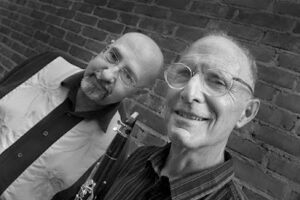
Alan Douglass (L) and Bert Stratton. 2022. (Photo by Lloyd Wolf)
There are two original members, still, in Yiddishe Cup: Alan Douglass (keys, vocals) and me. We’ve seen it all. Wait, here’s something we hadn’t seen until last month. Alan and I — and the rest of the band — played a Yekkie Orthodox Jewish wedding in Beachwood. Yekkie is Yiddish for “German Jew.” The groom’s family was originally from Frankfurt. The Yekkies held two back-to-back wedding ceremonies. The first was a German ceremony, called chuppa main. Then an hour later, we did the standard-issue OJ (Orthodox Jewish) ceremony. Even the OJ caterer said he had never seen a Yekkie doubleheader before. Also, there were no shouts of “mazel tov” after the smashing of the glass. The cantor sang Psalm 128 after the glass-smash, at which point the Yekkies shouted “mazel tov,” and we escorted the bride and groom out.
Booksellers, again . . . The Kleveland Klezmorim played Booksellers before Yiddishe Cup did. The Kleveland Klezmorim pioneered klez-jazz fusion. The Kleveland Klezmorim were founded in 1983 by marimba player Greg Selker. The Kleveland Klezmorim wouldn’t play “Hava Nagilah.” We would, so we got a lot of their gigs. The Kleveland Klezmorim disbanded in 1990. (Footnote: Alan Douglass was a founding member of the Kleveland Klezmorim.)
Yiddishe Cup’s next free, public gig is Purim at Park Synagogue, Pepper Pipes, Ohio, this Sat. (March 23). 7:45 pm. Still kickin’ out the jams.
March 20, 2024 1 Comment
CLEVELAND, CLARINET, COMEDY
In Mickey Katz’s autobiography, Papa, Play For Me, Katz tells some off-color jokes, like “Tailor, I have a problem. I have five penises. Will the pants fit?” The tailor says, “Like a glove.” Then Katz name drops: “I was part of a regular bridge game consisting of George Burns, Dave Siegel, George Raft, and myself. Occasionally Chico Marx.”
Katz kvells about his “creative wife” Grace, and sons Joel and Ron.
Fine, but the best stuff in the book is about Cleveland. Katz mentions many Cleveland landmarks. The first half of the book — before Katz moved to L.A. in 1946 — reads like an unofficial Jewish Encyclopedia of Cleveland. For instance, Katz mentions a musician who went to an East 105 Street bagel shop at 1 a.m. in 1935 and demanded a half-dozen fresh bagels, which he ate next door at Solomon’s deli (along with a corned beef sandwich) because Solomon’s was out of bagels. That’s detail.
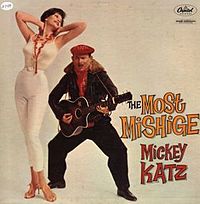
Mickey Katz 1959
In 1977, when the book came out, Katz was somewhat famous because his son Joel Grey was huge in Cabaret then. The first line in the book has the words “my son Joel Grey.” (The ghost writer of Katz’s autobio is Hannibal Coons, who was the main writer for the Addams Family.)
A couple decades ago, I took some Katz Yinglish (Yiddish-English) lyrics to a Workmen’s Circle meeting for translation. The translators – generally elderly Yiddishist purists — considered Katz shund (literary trash). Songs like “K’nock Around the Clock” and “Nudnik the Flying Shisl” (Pest the Flying Saucer) were beyond the pale.
I once lectured on Katz at the International Association of Yiddish Clubs convention in Cleveland (2007), and I met two musicians who had worked with him: cantor Hale Porter and singer Tanja Solnik. They had appeared with Katz in Hello Solly, a 1960s off-Broadway show. I asked them what Mickey had been like because I couldn’t tell from the autobio. I didn’t get a good answer from Tanja because she had been only 8 when she performed with Katz. She had been “Little Tanja.” Hale Porter didn’t say much memorable either. But it was interesting — at least for me — to simply meet people who had giggled with Mickele.
Myron “Mickey” Katz (1909 – 1985): Clevelander, clarinetist, comedian.
Katz writes about playing clarinet on the Goodtime, the Lake Erie cruise boat. (I’ve been on the Goodtime, and so has every other Clevelander.) The Goodtime was owned by the Seeandbee line. The “See” is for “Cleveland” and the “bee” is for “Buffalo.” Does that interest you?
February 28, 2024 No Comments
JAMMIN’ WITH SOME SALMON
“Struttin’ with Some Barbecue” by Lil Hardin Armstrong is probably the best song title. It has action, smell and humor. The worst song title is “Rise Up to New Jewish Music.” Some Jewish bands go for that sort of thing. (Anything “New” is old.)
The worst name of a klezmer band is the Klezmer Conservatory Band, They are a good band but a bad name. “Yiddishe Cup,” the name, gets the job done around town, but doesn’t land us any concerts at cool, mohel’s-edge music festivals. “Yiddishe Cup” is bubbe’s procus (stuffed cabbage). Very soggy.
I once changed the band’s name to Funk A Deli but that only confused people. Every Purim, a synagogue scheduler emailed and ask what the band’s name was going to be for that year.
Last month, when I was on vacation in Mexico, I was jamming on the street (which I often do on vacations to meet people), and I was playing “Misty,” when an American couple asked me if I knew any klezmer. I said, “So happens I do!” The couple was from Madison, Wisconsin, and had hired Yid Vicious for their wedding. I’ve always liked “Yid Vicious,” the name.
Speaking of which, I was playing a gig recently at a nursing home, Menorah Park, where the fairly new activities director came up to me and said, “Do you know any Jewish songs?”
I said, “Do you know who you’re talking to!” She didn’t. She explained that the new owners of the nursing home requested all musicians play at least “4 to 6 Jewish songs.” I said, “We can play 999 Jewish tunes if you want.”
Yiddishe Cup’s last CD, Klezmer Guy, 2009, was almost called Jammin’ With Some Salmon. I test-drove that title, and nobody understood it. “Nobody,” meaning my wife, Alice. I didn’t run the title by anybody else. I didn’t want the aggravation of multiple artistic input. I wasn’t running a democracy. I settled on Klezmer Guy and started this blog, Klezmer Guy: Real Music & Real Estate, to promote the album.
–Bert Struttin
P.S. To purchase a Klezmer Guy CD, contact Alan Douglass. He has a few cartons in his basement.
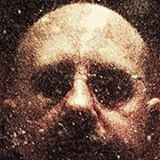
Alan Douglass (above) has cornered the market on “Klezmer Guy” CDs
February 7, 2024 4 Comments
“SPOKEN WORD” SPOKE TO ME
Myers, an independent-living facility in Beachwood, Ohio, had a front awning that read Myers Apartments. Why the word Apartments? Myers was eight stories and was an apartment building. It didn’t look like a swimming pool. I had a bad attitude going into Myers. I was determined not to play my usual Yiddish music standards, like “Bay Mir Bistu Sheyn” and “Tumbalaika.” Instead, I would read blog entries about real estate. My pianist, Alan Douglass, would follow up by singing “Dear Landlord” by Bob Dylan.
One Myers resident, seated in the front row, got up to leave halfway through the show. I suggested she stick around for “Gentile on My Mind” — a Yiddishe Cup tune — but she left. Alan and I went into “Because of You,” a Tony Bennett classic. That placated some people, but not her. And then I read more bloggie stuff. My wife, Alice, followed with some “oy-robics” — Jewish chair exercises. (“Turn your neck to the right. Kvetch to your neighbor.” That sort of thing.)
Afterward, Alice and I went to a Chinese restaurant to recap the show. We went to Ho Wah, where my mother and I had often dined. If my mother were still alive, she would not have liked the Myers show. Alice said, “Easy on the prose and Bob Dylan next time.”
I didn’t listen to Alice. I followed up with a similar program at the Maltz Museum of Jewish Heritage, where I melded real estate prose and klezmer. After the Schmaltz gig, I ran into poet Barry Zucker at Whole Foods. He was passing out ban-pesticides literature. Barry told me he often recited poetry to music at open readings. I thought the poetry-and-jazz combination had died out sixty years ago. (By the way, Barry looked like Allen Ginsberg.)
Dig this . . . Readings on the Beat Generation by Jack Kerouac, with Steve Allen on piano, produced by Bill Randle. That record hit me hard in college. Bill Randle — the Kerouac producer — had been a Cleveland DJ who moved to New York. [No, he traveled to NYC on weekends.] Randle used to play Yiddish Cup’s version of “Bay Mir Bistu Sheyn” on his Cleveland radio show in the 1990s. I was a fan of Randle mostly because of the Kerouac record. I even knew Randle’s favorite pants were Levi’s corduroys. (He mentioned that in a newspaper column he wrote.) Randle helped discover Elvis. Randle knew everybody. On his radio show, he would name-drop like crazy. Very big on Johnny Ray.
I borrowed the Readings on The Beat Generation record from the South Quad dorm library at Michigan. I didn’t live at South Quad and wasn’t allowed to borrow records; I snuck the LP out under my jacket, dubbed it onto a cassette, and returned the record. Kerouac read a story called “The History of Bop.” To repeat, Steve Allen on piano. Memorable.
“Spoken word” — I liked it. I did it again. I read prose with the Klezmer Guy Trio, which was pianist Alan Douglass, singer Tamar Gray, and me on prose (and clarinet). We performed at Nighttown, the premier jazz club in Cleveland, a couple times in the 2010s. Jim Wadsworth, the Nighttown booker, said to me at our final performance, “You know why this place is full tonight? Because of Tamar, your singer.” Thanks, Jimbo.
Here’s a spoken-word clip from 2010, live from the Maltz Museum:
November 15, 2023 3 Comments
CAR AND SAX TALK
My 2019 Subaru Legacy is the safest car in the world. I know you don’t care, but bear with me. The car has many blinkers and warning signals, and that’s why I bought it. Five years ago I fell asleep at the wheel of my Ford Fusion and drifted across a two-lane road into an oncoming car. I was tired. It was 2:30. Two-thirty pm, not 2:30 am! I was going about 25 mph and hit a Greek immigrant’s car head on. The accident happened on Larchmere Boulevard, right on the Cleveland-Shaker Heights line. Efficient Shaker cops showed up. Nobody got hurt! The accident was in front of Shaker Auto Body. I just wheeled my wrecked car right into the shop. Beautiful.
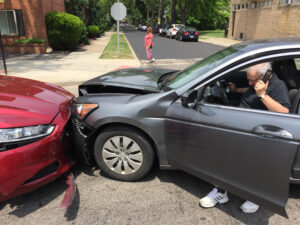
My red Ford Fusion and a Greek man on his phone
I bought the 2019 Subaru with all the bells and whistles shortly after the accident. The car is good, but the battery not so good. The battery recently went dead for the second time in four months. There’s a class-action suit against Subaru for bad batteries. I’m taking the car to the dealer, or maybe I’ll pay my son Ted to take it. I can’t stand going to car dealerships.
—
More car talk (and some sax talk) . . . Last month I was at a family wedding in a town halfway between San Diego and Los Angeles. (The wedding was at a winery. Nobody gets married at synagogue anymore, have you noticed? It’s always at a winery or a barn.) Uber — which my son Jack reserved ahead of time — didn’t show up at the hotel the morning after the wedding to take Alice and me to the airport. Instead, Uber sent us a message at 6 am: “Sorry.” Uber couldn’t find a driver. I should have hired a car service but I didn’t think of that. My daughter, Lucy, did, but too late, I guess. My son Ted booked Alice and me a flight out of Palm Springs because we couldn’t get to LAX on time. Ted drove us to Palm Springs and got a flat tire. Can you believe we got a flat on the way to the airport? I lent Ted my AAA card; he hung around the car; and Alice and I got an Uber.
Our flight out of Palm Springs was delayed, so I baggage-checked my saxophones. (My band had played the wedding. Terrific celebration, by the way.) The airlines could mangle my axes, but I didn’t care; I didn’t want to lug the heavy instruments around Palm Springs airport all afternoon.
My alto sax is student-level, so no big loss if it got destroyed. My tenor, however, is a classic, The Martin Tenor. I bought it around 1964 from a music teacher. When I first got that axe, it reeked of ciggy smoke, and its pads were brown from phlegm. That’s why I never took up smoking. At the Palm Springs airport, I plastered the tenor case with “Fragile” stickers. My clarinet, I kept in my backpack. It’s not heavy.
The saxes arrived in Cleveland about 11 hours later in fine shape. Better shape than me, actually. I’ve kept a couple “Fragile” stickers on the tenor case to remind me of my adventure.
By the way, the Subaru guys didn’t fix the “parasitic drainage” on my car battery. I might get a trickle charger. whatever that is.
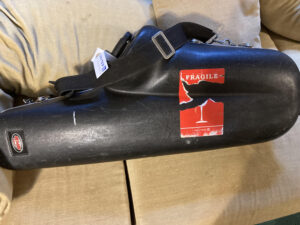
November 1, 2023 4 Comments
SOME HIP-SPANIC GIGS
Yiddishe Cup played on the Rio Grande for 2,500 cheering Mexican-Americans at the Chamizal National Monument, El Paso, Texas.
And yo– minus the band — played south of the border for 30 stone-faced Mexican ranchers. I heard a banda group in El Fuerte, Sinaloa, northern Mexico, They were on a side street. I heard a lot of horns, including a tuba. The Mexican musicians were playing for a horse auction. One of the musicians lent me his clarinet. I have seen better clarinets and reeds. I played horribly because of that reed. My son the drummer and I played a Meron-style nign. The Mexicans clapped. My family was on a hiking trip in northern Mexico in 2008; that’s how this banda thing happened.
I would like to play more Latin gigs. Kapelye, the klezmer band, once did a wedding in Mexico City. And Golem has played in Mexico a few times. To Yiddishe Cup’s crédito, we have played not once, but twice, on the Rio Grande in El Paso.
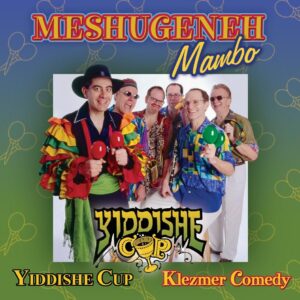
2004
Aside: in Cleveland I knew a dancer, Susana Weingarten de Evert, who grew up in Mexico City. Do all Jews in Mexico City have names like that?
I hope so.
Yo recuerdo when a Cleveland mom arranged a Jewish wedding for her daughter in El Salvador. I told the mom to fly down Yiddishe Cup. I said, “I’m sure the Jewish groom’s family can afford it, or they wouldn’t still be there.” She agreed to the “they could afford it,” but not the Yiddishe Cup part.
Yiddishe Cup has cornered the Latin-American Jewish doctor market in Cleveland — a market that fits into the backseat of a Toyota Camry. We did a gig for a Mexican Jewish doctor who headed the Cleveland Clinic evil eye center (Cole Eye Institute). Latin Jews party second only to Russian Jews.
Yiddishe Cup’s Latin repertoire goes from “Oye Como Va” to “El Rey.” We played an Ecuadorian Jewish wedding in Cleveland where I explained the chair-lifting to the groom’s gentile parents. I said in Spanish: “You will see people seated in chairs in the wind.”
Yiddishe Cup’s maximum hip-spanic gig was when we played “La Bamba” for an encore at our second outdoor concert in El Paso.
I miss those Latin gigs. We haven’t done any lately. For the record, I hope to sing “Bésame Mucho” tomorrow night at Yiddishe Cup’s gig in University Heights, Ohio. There is a clamor (somewhere) for the Yiddishe Cup/Latin thing.
—
Yidd Cup plays 7 pm tomorrow (Thurs., Aug. 17) at Walter Stinson Park, 2301 Fenwick Rd., University Heights, Ohio. Free. Bring a lawn chair or blanket.
August 16, 2023 1 Comment
ISRAEL INDEPENDENCE DAY, KLEZMER AND ME
At various Yiddishe Cup gigs, I was often surprised how the crowd would ask for Israeli tunes more than klezmer (Eastern European) tunes. Jews in Cleveland wanted Israeli music, got that? OK, I gave it to them. (Aside: classic Israeli tunes are easier to play than klezmer, which is instrument-based and leans toward virtuosic. Also, klezmer rhythms are typically more complex than classic Israeli tunes.)
Yiddishe Cup learned a lot of Israeli tunes, enough that many Israelis assumed we could belt out contemporary (not “classic”) Israeli music.
Israeli music — in the trade — is known as “Tel Aviv bus station music.” We had no clue how to play it. Luckily there was an Israeli singer in Cleveland, Shlomo Ziton, to cover that niche for 0ur town’s Israeli-American contingent.
On one Israel Independence Day (Yom Ha’atzmaut) I got in a dispute with a dance enthusiast who complained I wasn’t playing enough Israeli folk dances. “Too much klezmer,” he said. So I worked out a formula: play Israeli chalutzim (pioneer) classics, and for contemporary Israeli stuff plug in my iPhone or CD (depending on the decade). Very little klezmer.
Happy birthday, Israel!
And by the way, there was an article by Daniel Hoffman in Haaretz on Monday headlined “Why Do Israelis Still Hate Klezmer Music?” (Paywall.) “Secular Israelis have long rejected klezmer, an overt, emotional expression of Ashkenazi Jewish musical culture. Sometimes the strength of that opposition – and resistance to anything Yiddish, religious or associated with the Holocaust – knocks me flat.”
April 26, 2023 1 Comment
THE “KLEZMER GUY” QUIZ
1. What was the name of Yiddishe Cup before it was Yiddishe Cup?
A. Wild Horses
B. It has always been Yiddishe Cup
C. Kosher Spears
D. Funk A Deli
___
2. Who invented klezmer?
A. The Jews
B. The Klezmorim (Berkeley, Calif.)
C. Henry Sapoznik
___
3. What was Toby Stratton’s legal first name?
A. Toby
B. Wayne
C. Theodore
___
4. What did Toby want buried in his coffin?
A. Chlortrimeton allergy pills
B. a .22 rifle
C. The Wall Street Journal
D. None of above
___
5. How do musicians in Yiddishe Cup address their bandleader?
A. Ding-a-ling
B. Pissant
C. Sir
___
6. Yiddishe Cup has played
A. Brooklyn, New York
B. Brooklyn, Ohio
C. Louisville, Kentucky
___
7. A landlord’s biggest problem is
A. water leaks
B. bugs
C. tenants in “the industry” (food-service business)
___
8. Clarinetists are
A. cool
B. not cool
___
9. Toby’s favorite sport was
A. tennis
B. counting Jews in restaurants
C. softball
___
10. A musician’s main interest is
A. music
B. the food situation
C. the OT situation. (Is there overtime?)
___
11. (Tiebreaker) What was Toby’s blood type?
A. O
B. AB
C. A
February 28, 2023 2 Comments
THE RAG TRADE
There are quite a few black Yiddishe Cup T-shirts out there. I made about 500 of them. I have a photo of Mount St. Helens, Wash., man in a Yiddishe Cup T-shirt. Maybe I played his wedding. I have a photo of a Missoula, Mont., man wearing a Yiddishe Cup T-shirt.
Newlyweds and bar mitzvah moms got the tees for free. Sometimes the bat mitzvah celebrant — the kid, herself — got the tee if I thought the girl was woman enough to handle the peer harassment.
I saw a hipster on Coventry Road, Cleveland Heights, in a Yiddishe Cup T-shirt. I asked him where he got the tee. He said at a thrift store for $1.
December 28, 2022 3 Comments
SHUFFLE OFF TO BUFFALO
My wife, Alice, went on a road trip with Yiddishe Cup to Buffalo, New York. That was her first one. She had always refused road trips. Alice made two beginner’s mistakes. She talked too much. Talking wears you out. Also, she did not catnap.
We played the gig in Buffalo. The whole undertaking was 13 hours (7 hours driving there and back, and two hours of set up and tear down. Oh, and we played music. Alice did the dance-leading. Alice aged a year that day, she said. She said she had been “hit by a truck.”
Pace yourself, Alice. Take catnaps. Drink a lot of fluids. Eat an apple.
Same subject, sort of:
I used to blame Taco Bell for post-gig illnesses. T-Bell was poisoning me. T-Bell was slipping me spoiled tacos.
My migraines were always on Tuesdays after out-of-town gig weekends. I’d return the rental van on Monday morning and dispute fender dings; then go to my real estate job to talk about burst water pipes and late rents. When I’d come home on Monday evenings, my sleep cycle would be all off.
I haven’t done a run-out (one-day road trip, no overnight) in a few years. I don’t miss it.
December 21, 2022 6 Comments
INSULT A BAND HERE
Several musicians in my band freaked out when a critic described Yiddishe Cup’s Klezmerized recording as “schizophrenic.” The reviewer said a ton of nice stuff about the recording and then noted we were schizophrenic because we attempted so many different styles.
“Schizophrenic” — the word — was all the band members could think about. Grow up. You need the skin of a rhino to be a performer. Everybody is a critic, and if you aren’t a critic, here are some tips to make you one:
The best way to knee-cap a jazz group: “They don’t swing.”
A blues band: “No soul.”
A klezmer band: “Dorks in vests.”
—
I have an essay in the Cleveland Plain Dealer today, “Who’s your favorite band?”
November 30, 2022 1 Comment



